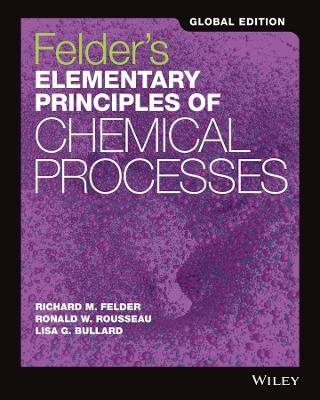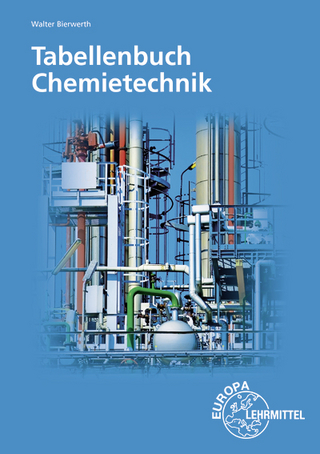
Felder's Elementary Principles of Chemical Processes, Global Edition
John Wiley & Sons Inc (Verlag)
9781118092392 (ISBN)
Felder's Elementary Principles of Chemical Processes prepares students to formulate and solve material and energy balances in chemical process systems and lays the foundation for subsequent courses in chemical engineering. The text provides a realistic, informative, and positive introduction to the practice of chemical engineering.
This classic text has provided generations of aspiring chemical engineers with a solid foundation in the discipline – engineering problem analysis, material balances and energy balances.
Richard Felder is a recognized global leader in the field of engineering education and this text embodies a lifetime of study and practice in effective teaching techniques.
The text is in use at more than 4 out of 5 chemical engineering programs in the US.
About the Authors iii
Preface to the Fourth Edition iv
Notes to Instructors v
Digital Resources and WileyPLUS vi
Postscript: Introduction to an Author vii
Nomenclature viii
Glossary of Chemical Process Terms x
PART 1 Engineering Problem Analysis 1
CHAPTER 1 What Some Chemical Engineers Do for a Living 3
CHAPTER 2 Introduction to Engineering Calculations 5
2.0 Learning Objectives 5
2.1 Units and Dimensions 6
2.2 Conversion of Units 7
2.3 Systems of Units 8
2.4 Force and Weight 10
2.5 Numerical Calculation and Estimation 12
2.6 Dimensional Homogeneity and Dimensionless Quantities 19
2.7 Process Data Representation and Analysis 21
2.8 Summary 30
Problems 30
CHAPTER 3 Processes and Process Variables 35
3.0 Learning Objectives 35
3.1 Mass and Volume 36
3.2 Flow Rate 38
3.3 Chemical Composition 40
3.4 Pressure 47
3.5 Temperature 54
3.6 Summary 57
Problems 58
PART 2 Material Balances 67
CHAPTER 4 Fundamentals of Material Balances 69
4.0 Learning Objectives 69
4.1 Process Classification 70
4.2 Balances 71
4.3 Material Balance Calculations 75
4.4 Balances on Multiple-Unit Processes 94
4.5 Recycle and Bypass 100
4.6 Chemical Reaction Stoichiometry 107
4.7 Balances on Reactive Processes 118
4.8 Combustion Reactions 139
4.9 Some Additional Considerations about Chemical Processes 147
4.10 Summary 150
Problems 151
CHAPTER 5 Single-Phase Systems 160
5.0 Learning Objectives 161
5.1 Liquid and Solid Densities 162
5.2 Ideal Gases 164
5.3 Equations of State for Nonideal Gases 172
5.4 The Compressibility-Factor Equation of State 179
5.5 Summary 186
Problems 186
CHAPTER 6 Multiphase Systems 195
6.0 Learning Objectives 197
6.1 Single-Component Phase Equilibrium 198
6.2 The Gibbs Phase Rule 204
6.3 Gas–Liquid Systems: One Condensable Component 206
6.4 Multicomponent Gas–Liquid Systems 212
6.5 Solutions of Solids in Liquids 221
6.6 Equilibrium between Two Liquid Phases 229
6.7 Adsorption on Solid Surfaces 233
6.8 Summary 236
Problems 238
PART 3 Energy Balances 253
CHAPTER 7 Energy and Energy Balances 255
7.0 Learning Objectives 256
7.1 Forms of Energy: The First Law of Thermodynamics 257
7.2 Kinetic and Potential Energy 259
7.3 Energy Balances on Closed Systems 260
7.4 Energy Balances on Open Systems at Steady State 262
7.5 Tables of Thermodynamic Data 267
7.6 Energy Balance Procedures 272
7.7 Mechanical Energy Balances 275
7.8 Summary 280
Problems 282
CHAPTER 8 Balances on Nonreactive Processes 291
8.0 Learning Objectives 291
8.1 Elements of Energy Balance Calculations 292
8.2 Changes in Pressure at Constant Temperature 300
8.3 Changes in Temperature 301
8.4 Phase-Change Operations 313
8.5 Mixing and Solution 332
8.6 Summary 343
Problems 345
CHAPTER 9 Balances on Reactive Processes 363
9.0 Learning Objectives 364
9.1 Heats of Reaction 364
9.2 Measurement and Calculation of Heats of Reaction: Hess’s Law 369
9.3 Formation Reactions and Heats of Formation 371
9.4 Heats of Combustion 373
9.5 Energy Balances on Reactive Processes 374
9.6 Fuels and Combustion 389
9.7 Summary 399
Problems 401
CHAPTER 10 Balances on Transient Processes 416
10.0 Learning Objectives 416
10.1 The General Balance Equation . . . Again 416
10.2 Material Balances 421
10.3 Energy Balances on Single-Phase Nonreactive Processes 428
10.4 Simultaneous Transient Balances 433
10.5 Summary 436
Problems 437
APPENDIX A Computational Techniques 443
A.1 The Method of Least Squares 443
A.2 Iterative Solution of Nonlinear Algebraic Equations 446
A.3 Numerical Integration 459
APPENDIX B Physical Property Tables 463
B.1 Selected Physical Property Data 464
B.2 Heat Capacities 471
B.3 Vapor Pressure of Water 474
B.4 Antoine Equation Constants 476
B.5 Properties of Saturated Steam: Temperature Table 478
B.6 Properties of Saturated Steam: Pressure Table 480
B.7 Properties of Superheated Steam 486
B.8 Specific Enthalpies of Selected Gases: SI Units 488
B.9 Specific Enthalpies of Selected Gases: U.S. Customary Units 488
B.10 Atomic Heat Capacities for Kopp’s Rule 489
B.11 Integral Heats of Solution and Mixing at 25°C 489
Answers to Test Yourselves 490
Answers to Selected Problems 498
Index 500
| Erscheinungsdatum | 04.10.2016 |
|---|---|
| Verlagsort | New York |
| Sprache | englisch |
| Maße | 203 x 254 mm |
| Gewicht | 26 g |
| Themenwelt | Naturwissenschaften ► Chemie ► Technische Chemie |
| Technik | |
| ISBN-13 | 9781118092392 / 9781118092392 |
| Zustand | Neuware |
| Informationen gemäß Produktsicherheitsverordnung (GPSR) | |
| Haben Sie eine Frage zum Produkt? |
aus dem Bereich


